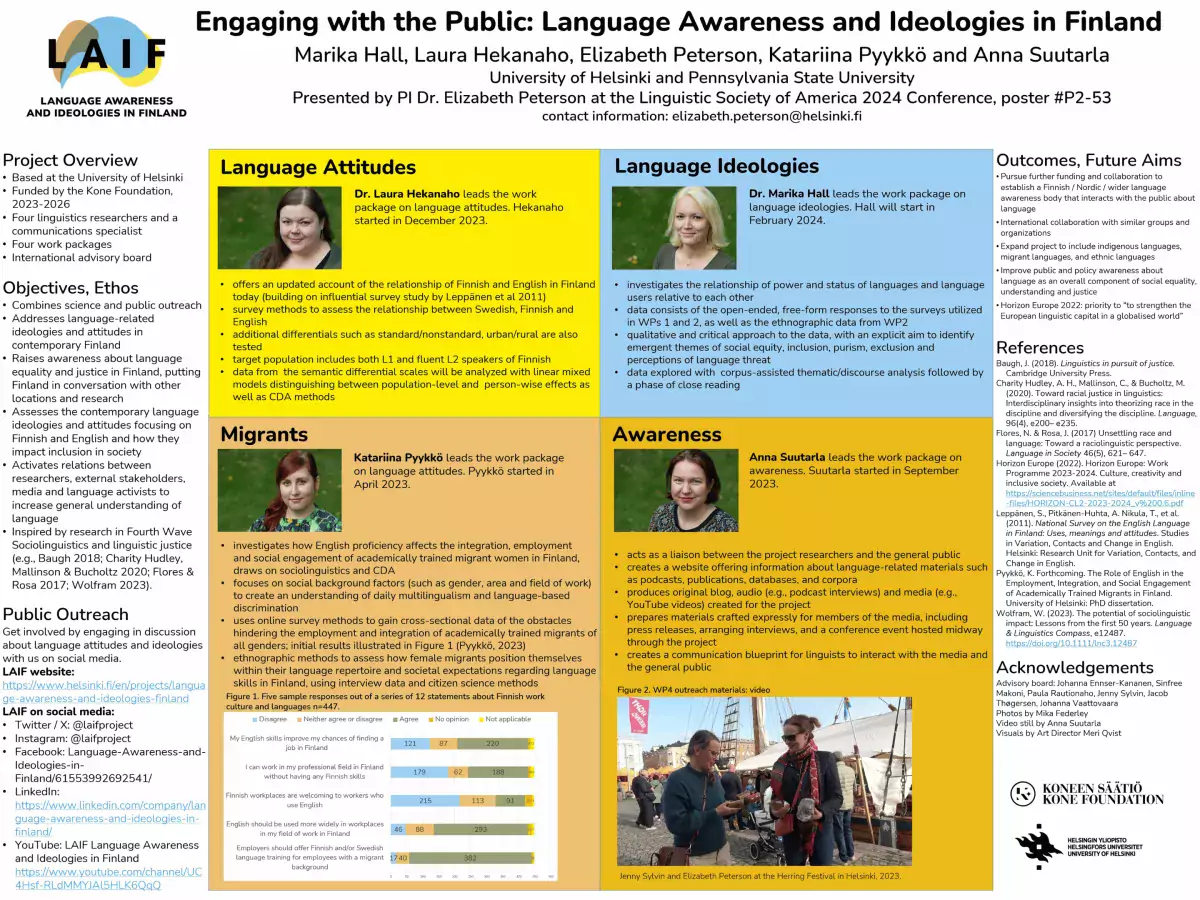Outputs
Edited by Elizabeth Peterson and Kristy Beers Fägersten
- Presentations at the
conference, 13 Jun 2024, Helsinki. - Laura Hekanaho: Attitudes towards English in Finland.
- Katariina Pyykkö: Academically trained migrants navigating multilingual workplaces in Finland.
- Elizabeth Peterson: Keynote speech at the
conference.
- Katariina Pyykkö, Laura Hekanaho and Marika Hall: LAIF-hanke esittäytyy. Workshop presentation at the
, 7 May 2024, Jyväskylä.
- Elizabeth Peterson and Katariina Pyykkö: Language Attitudes and Ideologies: a research project on language tensions in Finland. Presentation at the
29 Nov 2023 to 1 Dec 2023, Jyväskylä.
- Elizabeth Peterson: Poster presentation at the
- Katariina Pyykkö: Englannin kielen rooli Suomeen muuttaneiden korkeakoulutettujen työllistymisessä, kotoutumisessa ja osallisuudessa – pilottikyselyn aineistoa. Presentation at the Miten Suomi puhuu seminar, 24 Aug 2023, Turku.
- Elizabeth Peterson and Katariina Pyykkö: Language Awareness and Ideologies in Finland -hankkeen esittely. Presentation at the Miten Suomi puhuu seminar, 24 Aug 2023, Turku.
- Elizabeth Peterson and Katariina Pyykkö: Exploring conflicting ideologies: the relationship of exceptionalism and English in Finland. Presentation at the
(IPrA), 9 Jul to 14 Jul 2023, Brussels, Belgium.
- Katariina Pyykkö: Role of English in the employment, integration, and social engagement of migrant women in Finland. Presentation at the Translanguaging in the Age of (Im)mobility: Fourth International Conference on Translanguaging, 12 Jun to 14 Jun 2023, Falun, Sweden.
- Katariina Pyykkö:
(webinar)
For several decades, linguists – especially researchers in the field of sociolinguistics – have advanced the principle of debt incurred (Labov 1982), as well as (pro)active social engagement (Wolfram 2023) and a critical, activist stance against language injustice in various settings (Baugh 2018, Charity Hudley et al 2020, Flores & Rosa 2017).
This poster presents an overview of the Language Attitudes and Ideologies in Finland project, funded by the Kone Foundation (2023–2026). The project builds on decades of previous public outreach efforts concerning language and linguistics, focusing in this case on the setting of Finland. The project addresses current pressing (socio)linguistic issues in Finland, including perceived threats about the viability of the Finnish language in the face of English and globalization, contemporary multilingualism in Finland, and the role of migrants, their languages, and their role as second language speakers of Finnish. While the research primarily focuses on linguistic phenomena in the setting of Finland, it is both inspired by and draws heavily from research in other locations, especially the USA, and what has been called Fourth Wave Sociolinguistics.
There are two defining characteristics of the research project. First is its driving principle that engaging with the public about linguistic research necessitates navigating commonly held ideologies and attitudes about language (see, e.g., Milroy 2001). In short: informing the public about linguistic findings is not enough; mutual engagement is necessary. A second defining characteristic, related to the first, is the project’s dedicated aim of involving the public through citizen science methods, as well as including a professional communications expert as a member of the core working group. This communication expert works as a liaison between the general public and project researchers for the duration of the project. A key output at the project’s end will be a communication blueprint for linguists, available in English and Finnish, on interacting with the media and the general public. This poster presents the project’s main research outputs as of January 2024, which include a survey about migrant languages in Finland and a critical examination of public discourse about language, as well as an account of the public outreach involved in these studies.
Baugh, J. (2003). Linguistic profiling. In C. Makoni, G. Smitherman, A. F. Ball, & A. K.
Spears (Eds.), Black linguis-tics: Language, society, and politics in Africa and the Americas
(pp. 155–168). Routledge.
Charity Hudley, A. H., Mallinson, C., & Bucholtz, M. (2020). Toward racial justice in
linguistics: Interdisciplinary insights into theorizing race in the discipline and diversifying the
discipline. Language, 96(4), e200– e235. (Wolfram, 2023)
Flores, N. & Rosa, J. (2017) Unsettling race and language: Toward a raciolinguistic
perspective Language in Society 46(5), 621– 647.
Labov, W. (1982). Objectivity and commitment in linguistic science. Language in Society,
11(2), 165– 201.
Milroy, James. 2001. Language ideologies and the consequences of standardization.
Journal of Sociolinguistics 5(4): 530–555.
Wolfram, W. (2023). The potential of sociolinguistic impact: Lessons from the first 50 years.
Language & Linguistics Compass, e12487.
